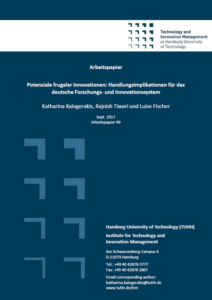Authors: Daniel Tobias Hagenau, Rajnish Tiwari
Abstract: After an initial introduction into the areas of innovations within emerging markets, the study develops a consistent innovation typology for categorizing large data samples from a variety of existing literature. It then describes and finally evaluates a sample of 178 innovations for the Indian market based on 38 different criteria. It uses internet-based news reports over a 2 year timeframe for the study sample.
T he study’s results show a considerable amount of radical innovations and innovations with disruptive potential among the sample and a special concentration on small- and micro-sized innovators from India. It confirms previous suggestions that India is especially focused on innovations within the software and electronics engineering sectors. The results also support the importance of local knowledge and ‘social capital’ for successful disruptive innovation. Finally, a perceivable increase in the technology orientation of innovations by foreign companies suggests a continuous build-up of local technology-competence and foreign trust in the same.
he study’s results show a considerable amount of radical innovations and innovations with disruptive potential among the sample and a special concentration on small- and micro-sized innovators from India. It confirms previous suggestions that India is especially focused on innovations within the software and electronics engineering sectors. The results also support the importance of local knowledge and ‘social capital’ for successful disruptive innovation. Finally, a perceivable increase in the technology orientation of innovations by foreign companies suggests a continuous build-up of local technology-competence and foreign trust in the same.
A focus on local competencies and the leading position of India concerning innovative distribution are among the managerial implication of the study. It also opens numerous avenues for future research, expanding both depth and scale of the database as well as the analysis underlying this study.
[Check the publisher’s version]
[Read the unedited, authors’ version]
Keywords: Frugal Innovation; India; Innovation Typology; Disruptive Innovation; Local Competencies
Suggested citation: Hagenau D.T., Tiwari R. (2017) Made in India for the World: An Empirical Investigation into Novelty and Nature of Innovations. In: Herstatt C., Tiwari R. (eds) Lead Market India. India Studies in Business and Economics. P. 163-192, Springer, Cham
—
The featured publications series
With this article, CFI is introducing a new series of “featured publications” with the intention to share its select contributions to the social and scholarly discourse with the broad community. Some of these article have been published in mediums that are not freely available to the public. In such cases, we will seek to provide access to unedited, authors’ versions of the publications, wherever feasible.
 In a fruitful cooperation between Center for Frugal Innovation (CFI) and the Cambridge Judge Business School, University of Cambridge, Rajnish Tiwari and Jaideep Prabhu have published a conceptual paper on the potential role of frugal innovations in contributing to “soft power” of its creators.
In a fruitful cooperation between Center for Frugal Innovation (CFI) and the Cambridge Judge Business School, University of Cambridge, Rajnish Tiwari and Jaideep Prabhu have published a conceptual paper on the potential role of frugal innovations in contributing to “soft power” of its creators.


